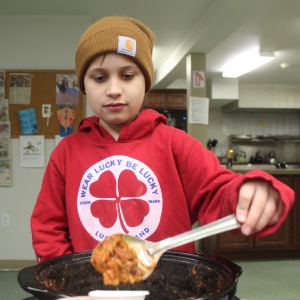Peter Zheutlin speaks at Monadnock Summer Lyceum about how dogs changed his life
| Published: 08-12-2024 12:01 PM |
A single photograph of Albie, a rescue dog from Louisiana, changed the course of journalist Peter Zheutlin’s life, not only converting him to a devoted dog-lover, but taking him into the front lines of animal rescue in the United States.
Zheutlin admitted during Sunday’s “How My Life Went to the Dogs” Monadnock Summer Lyceum presentation at Peterborough Unitarian Universalist Church that the first time he heard the term “rescue dog,” he thought his wife was referring to a St. Bernard rescuing lost hikers in the Alps. Not a “dog person,” Zheutlin tried to stave off getting a family dog, distracting his two sons for several years with “a hamster, a rabbit, a cockatiel and fish who all disappeared like something out of Agatha Christie.”
After hearing about a Lab rescue organization, Zheutlin fell in love with the photo of Albie, a yellow Lab mix, on Petfinder. Zheutlin was surprised to find out that Albie was in Louisiana and would be traveling north on a dog transport RV called the “Road Trip Rescue.” He and his family then learned that the Ohio-based volunteer driver, Greg Mahle, updates families waiting for their newly rescued dogs throughout the journey north through his “Road Trip Rescue” Facebook page.
“He built excitement for the whole trip of bringing these dogs north, and I got really curious about this whole process,” Zheutlin said. “I wondered why Albie came from Louisiana, I wondered about this huge transport vehicle with 80 other dogs.”
After having Albie for a while and meeting owners of other rescue dogs, Zheutlin realized the his dog’s story was a common one.
“Meeting other dog-owners after we got Albie, I realized most rescue dogs were from the South – Alabama, Mississippi, Georgia. I got curious about why this was,” he said.
Zheutlin, a freelance journalist and bestselling nonfiction author, had previously written about little-known historic figures and pop culture. To research dog rescue, he asked Mahle if he could ride along for the last day of the trip from Louisiana, and later accompanied him on an entire north-south run, delivering 80 dogs to their new families up and down the Eastern seaboard.
“It was exhausting. It was really physical work, and we were filthy. I’m someone who likes to shower every day, and Greg told me when we started out, ‘Don’t worry, you can shower in four days, when we get to Virginia,’” Zheutlin said. “We slept in the aisle of the bus, in between the kennels. I did not sleep very much.”
Article continues after...
Yesterday's Most Read Articles
 Monadnock organizers rally with thousands in Concord in protest of Trump administration
Monadnock organizers rally with thousands in Concord in protest of Trump administration
 New Ipswich kicks off 275th anniversary celebration with chili contest
New Ipswich kicks off 275th anniversary celebration with chili contest
 House committee reverses vote, adopts prohibition on DEI activities and spending
House committee reverses vote, adopts prohibition on DEI activities and spending
 State Supreme Court denies Armando Barron’s appeal of murder conviction
State Supreme Court denies Armando Barron’s appeal of murder conviction
 Monadnock Food Co-op will not be coming to Peterborough
Monadnock Food Co-op will not be coming to Peterborough
Zheutlin was amazed by the kindness of volunteers along the route who meet the bus every single trip to help walk, feed, water and give affection to 80 anxious animals.
“It is a ton of work. It really takes a village to rescue one animal,” Zheutlin said.
As he delved into the huge imbalance between the population of stray dogs in the South and in the Northeast, Zheutlin was staggered by the scale of the problem.
“Some of these dog pounds in the South just have really rough conditions. There is no hygiene. You will see dead dogs; there is a lot of suffering. For rescue workers on the ground, there is a lot of burnout. Most dogs do not get to ride on that rescue truck. In every shelter, the rescue organizations can only save a handful of dogs. These are ordinary people, spending real money to save these dogs, and they are not wealthy people,” Zheutlin said.
Zheutlin notes that the passion for animal rescue transcends politics.
“Usually, I’m a very political person, but meeting these rescue volunteers, I realized they are from all different political backgrounds, and they all types of people who just want to help,” Zheutlin said.
When asked by a member of the audience what could be done about the problem of stray dogs in Southern states, Zheutlin said he believes only a cultural shift could change the situation.
“I was in Houston, and there are just stray dogs all over the place – not neutered, not spayed. You see someone kicking a dog, and they say, ‘It’s just a dog.’ We can’t spay and neuter our way out of this situation. There has to be a change in the way we perceive dogs,” he said.
Zheutlin’s book, “Rescue Road: One Man, Thirty Thousand Dogs, and A Million Miles on the Last Hope Highway” tells the story of Mahle and his dedication to bringing Southern rescue dogs to the Northeast. A second book, “Rescued,” tells stories of “second-chance dogs,” while “The Dog Went Over the Mountain” chronicles Zheutlin’s cross-country travels with Albie.
Allison Aldrich Smith, founder of Animaterra Women’s Chorus, will present “How Can We Keep from Singing?” Aug. 18 at 11 a.m.








 Franklin Pierce University holds Fitzwater Center Honors ceremony
Franklin Pierce University holds Fitzwater Center Honors ceremony From the Stacks: Ella Cademartori – Introducing the Crotched Mountain Consortium
From the Stacks: Ella Cademartori – Introducing the Crotched Mountain Consortium Great Brook School students take part in panel
Great Brook School students take part in panel
